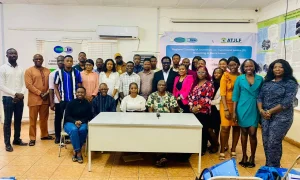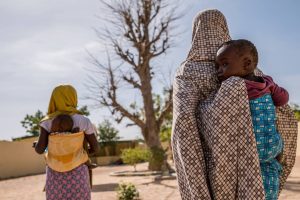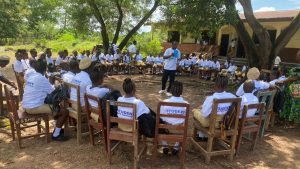It was a particularly hot day in Freetown and we had for the first time, pushed the limits of the Toyota 4Runner SUV we had been driving the entire week. I needed to join a boat at the Kissy Ferry terminal to Lungi and I was behind time. The driver with horns blazing, cleverly maneuvered through the narrow streets of Freetown, toward the Kissy terminal. Luckily for us, a government VIP official was to travel on the same boat and we arrived to see his convoy of military jeeps waiting to be loaded on the boat. This bought us some time as the boat had been delayed at the convenience of the government official.
The boat was old and worn. It swayed gently on its anchor as it was being loaded. It was a sharp contrast from the Sea Coach Ferry, which was a modern air-conditioned boat that conveyed me from the Lungi International Airport to Freetown when I arrived in Sierra Leone at the beginning of the week. I was fascinated by the lively bustle around the Kissy Terminal boat. It was a noisy rowdy march as we made our way to the boat. I clutched my phones tightly as we began to climb the stairs onto the boat. When we eventually got on the boat, it was a mini-city – there were vendors, hawkers, beggars, and even musical acts. Shortly after I had sat down, a middle-aged woman came towards me waving a donation envelope as she struggled with clumsy gesticulations. I could tell that her hearing and speech were impaired. I initially pretended not to have seen her but she was not having it. She came closer and began to ‘pray’ for me. I knew there was no way out. I reached into my pocket and handed her some notes in the local currency. She immediately ended the prayers and collected the money with a tired smile on her face.
The non-recognition of the unique reparations need of victims and survivors of the civil war is an unfortunate pointer to the fact that the government seems to be moving on while leaving victims behind.
As the boat floated on, so did my thoughts. They managed to float away from the boat’s the noise. I reflected on the interviews I had earlier in the week with victims of the Civil War in Sierra Leone. Images of people I saw on the streets of Freetown with amputated limbs came back to me as a stark reminder of the atrocities and gross human rights violations that marked the Civil War. I struggled with the thought of how it seemed like the country had moved on without adequately addressing the needs of the war’s victims. The non-implementation of relevant recommendations made by the 2002 Truth and Reconciliation Commission (TRC) in Sierra Leone continues to create gaps in the country’s transitional justice process. For instance, the TRC made a recommendation for the establishment of a Special Fund for War Victims, but this Fund was not established. For survivors and victims, there has been no sufficient justice for the atrocities they suffered despite the indictment and conviction of key actors during the war by the Special Court of Sierra Leone. Justice, for a lot of those I interviewed, meant reparations. For them, justice still remains a distant hope. More also, victims of sexual-based violence during the war in addition to the lack of reparations, continue to suffer from neglect and stigma in their communities. The National Commission for Social Action (NaCSA) which had the mandate of providing reparations for victims has been repurposed to engage in general social relief programs, community development, and alleviation of poverty. The non-recognition of the unique reparations need of victims and survivors of the civil war is an unfortunate pointer to the fact that the government seems to be moving on while leaving victims behind.
The unfortunate trend of leaving victims behind is not peculiar to Sierra Leone. The same assertion can be made, without guilt about the transitional justice process in Nigeria. Ironically, the Operation Safe Corridor is anything but safe for victims of the Boko haram crisis in northeast Nigeria. My field trip to Nigeria revealed how victims in Nigeria are left behind under the government’s transitional justice program. The approach is largely perpetrator-centric while victims wallow in neglect. This has resulted in a lack of community ownership of the disarmament, demobilization, and reintegration (DDR) process. Other factors affecting the process are; the corruption and lack of accountability associated with Operation Safe Corridor. In all of these, victims are at the receiving end of neglect and continuing human rights violations. Pertinent to ask, are questions regarding the role of the North East Development Commission in ensuring victims of the conflict are not left behind. Also, since the passage of the Borno State Social Investment Bill in September 2023, not much has been heard about its implementation. The implementation of this Law which seeks to provide legal backing for the state to render special support to victims of Boko Haram attacks in Maiduguri is very key in ensuring justice and repair for victims of the Boko haram conflict.
At the core of an effective transitional justice process is the recognition and acknowledgment of victims’ perspectives. Where this is lacking, the process often becomes non-inclusive and fails.
My field trip took me to the Gambia as well. While there, I relished the beauty of nature as I explored one of the country’s beaches. It was bright and beautiful. I sadly do not share the same enthusiasm about the plight of victims of Yahya Jammeh’s dictatorship. Like in Sierra Leone and Nigeria, the same sense of neglect is expressed by victims who are appalled by the slow pace of the transitional justice process and the lack of reparations. As the Gambia undergoes its transitional justice journey, it is crucial to heed lessons from Sierra Leone and Nigeria, particularly in how not to treat victims and survivors. With the recent enactment of the Victims’ Reparations Bill and imminence of a Victims’ Reparations Commission, I hope that the Gambia gets it right. There are however a few things the government could have done differently, for instance, the careless and arbitrary release of perpetrators back into communities without any sense of justice for the victims is not indicative of an approach that recognizes the plights of victims. Also, the huge communication gap between the government and victims on the government’s plan and activities on transitional justice continues to erode public trust in the government’s commitment to transitional justice.
At the core of an effective transitional justice process is the recognition and acknowledgment of victims’ perspectives. Where this is lacking, the process often becomes non-inclusive and fails. It is pertinent to restore and repair victims if there will ever be sustainable peace and justice. I do hope that the governments of Sierra Leone, Nigeria, and the Gambia will commit to implementing processes that will include victims rather than leave them behind. It is a debt of justice that ought to be paid in the interest of humanity.
Author
-
Emmanuel is the Grants and Programs Officer overseeing ATJLF's grantmaking in Nigeria, Sierra Leone and The Gambia, including ATJLF's strategic partnership with the African Union.
View all posts



